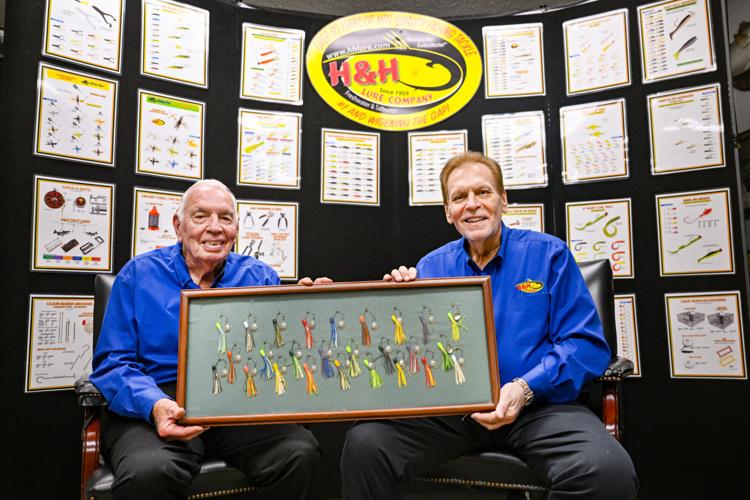By the time most men hit age 87, they are long into retirement, long into crossing out want-to-do adventures from their bucket lists, long past what anyone could, would or should believe a man at this stage should be doing to be productive.
Not Bill Humphreys — until the day, earlier this spring, when he decided it was time to slow down the daily grind of heading H&H Lure Compnay, one of Louisiana’s largest fishing tackle manufacturing and distribution operations.
H&H was, has been and is Bill Humphreys Sr. since he began traveling across the Deep South selling spinnerbaits.
Since 1959, H&H has grown from producing spinnerbaits in a variety of colors and styles to a worldwide distributor with a little more than 25,000 products embracing all corners of the fishing world.
Yep, 1959, a year before Bill Humphreys Jr. came along to sit on his father’s knee then stand at his side to learn “the business.”
Now, 65 years after filling that old panel truck and traveling the roads hawking H&H wares, Bill Humphreys Sr. is stepping aside. Bill Jr. will take over the daily operation. Bill Sr. will announce he’s retiring during the annual ICAST Show coming in July in Orlando, Florida.
ICAST is the largest fishing tackle and fishing trade show in the U.S.
“I guess everyone expected me to be retired by now,” Bill Sr. said through a chuckle. “Billy is going to run the company, and I’m going to stay on in an advisory capacity.”
Besides being an industry leader, what most industry veterans remember is how Bill Sr. changed the face of making tackle, especially when it came to making spinnerbaits and jigheads.
“I saw the way some jewelry makers were casting gold and silver into molds, and using a machine to make jewelry,” he said.
So, he thought, he could use the same process to cast the lead heads used on all spinnerbaits and jigheads. Stonewalled by jewelers, who, he said, couldn’t help or didn’t understand what he wanted to do, Humphreys went to Providence, Rhode Island, the place he said was the center of the country’s jewelry trade.
“They understood,” he said, and from there Humphreys developed a centrifugal-force machine complete with molds to make fishing tackle. The process revolutionized his business.
In the time it took him and his Baton Rouge employees to make one-at-a-time lures, the machine was turning out hundreds of spinnerbait bodies.
“I’m pretty proud of coming up with that process,” he said. “Everyone uses it now.”
The same with two popular soft-plastic lures etched into the south Louisiana fishing lore — the Cocahoe Minnow and the Split-tail Beetle.
“We fished with (live) cocahoe minnows on the coast and I thought we could come up with a bait that would mimic the action of a live minnow,” Humphreys Sr. said. “We developed a mold and the plastic and the pigment and, later, the glitter for the Cocahoe Minnow.
“All we had to do was find a way to make hundreds instead of pouring one at a time.”
Enter another Louisianan, Glynn Carver, a chemistry professor at McNeese State who came up with a injectable plastic compound and had the machines to turn out thousands of soft-plastic lures a day.
“The Cocahoe Minnow turned out to be a big hit across Louisiana and into Mississippi and Texas,” he said. “It was new and something that caught fish and started a whole new branch of our business.”
The Splittail Beetle was another. Threaded onto a jighead and rigged in tandem, the split-tail lure hauled in two speckled trout at a time on some trips and turned out to be a freshwater bait, too, when the body was subbed for a skirt on a spinnerbait — bass and speckled trout and other saltwater species like the same lure.
Yet there is another side of Bill Humphreys Sr. few know, about how much he accomplished outside the fishing industry.
Some, like the Rick Huckabay-coached Redemptorist High School basketball teams, remember the summer the elder Humphreys secured the funding to take the Wolves team to El Salvador to put on basketball clinics.
Bill Sr. recalled, almost like it was yesterday, the day when armed revolutionaries stormed into the Sheraton Hotel as part of the push to overthrow the extant El Salvador government. That was after he secured $45,000 in sporting goods equipment for youngsters in that country and had brought Tara High School coaches B.L. Fairchild and Bill Whittle along to teach the kids about sports in the U.S.
Some, like doctors in the Baton Rouge area, remember him for the work he did in providing medical clinics and furnishing a hospital, including a full operating room, in Honduras, where he moved his manufacturing operation after years of producing lures in Baton Rouge.
Or, like the time he packed several containers with supplies to ship to Honduras after Hurricane Mitch roared through that Central American country killing more than 30,000 and devastating what little infrastructure there was outside of the main cities.
“Yes, I miss the volunteer work, but we did good things in those countries,” Bill Sr. said.
That was then. It’s the “now” that brought on his decision.
“At 87, it’s time to step back,” he said.
The lingering question — how?
“Oh, I’m going to have to be weaned off a routine,” Bill Sr. said. “I’m here every day, and I guess I’m going to miss it … well, maybe I won’t miss the day-to-day business part. It’s demanding, and I know Billy will take up the reins because he knows this business inside and out.
“I’ve met a lot of great people along the way. It’s been fun, a lot of work, but fun, a lot of ups and downs, but mostly ups. And I’m blessed and very thankful.”



